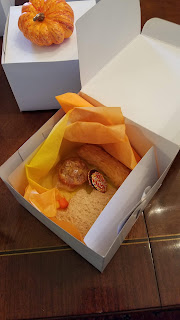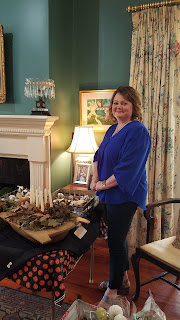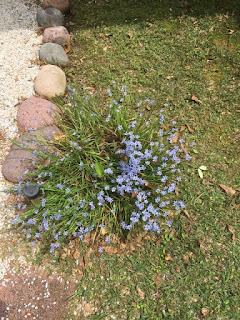Mike and Bev Colquett are more than just busy, they are productive. Back in May they invited Monroeville Garden Club members out to their bee farm, Green Acres, for a honey extraction demonstration. Mike and Bev started keeping bees several years ago and Mike talked about how beekeeping and honey extraction has become more than just a hobby.
If you've never learned about the importance of honeybees and the vital role they play in our ecosystem you might be amazed. Mike did a wonderful job of explaining a few basics: Honeybees live together in colonies and each bee has a specific job. Worker bees forage for food, and build and protect the hive. Drones are male bees whose purpose is to mate with the queen. There can be only one queen per hive and she can live up to five years. Some colonies have as many as 60-80,000 bees in them! Bees communicate with each other by doing what is called a waggle dance, which lets other bees know where to find sources of nectar, pollen and other important things. Honeybees are among the most numerous and efficient pollinator species in the world. The average honeybee can visit more than 2000 flowers in one day, which greatly increases the chance of a plant producing a fruit or vegetable. In commercial farming honeybees are used to pollinate over 100 crops grown in North America alone, and this contributes an estimated $15 billion to the industry in the United States each year.
Most of us know a little about the benefits of pure, raw honey. Rich in antioxidants (the darker the honey, the more antioxidants it has), honey may lower the risk of heart attacks, strokes, and some types of cancer. It can also help lower blood pressure and triglycerides, and improve cholesterol. Honey has long been used in wound/burn care, helping the body heal itself faster. It's a natural cough and cold remedy and a soother of sore throats. Honey never spoils as long as it is sealed properly, and many would agree the taste of pure honey is second to none. Unfortunately, almost 75% of the honey sold in supermarkets has been adulterated. It is cut with cheap, processed sweeteners cane sugar, high fructose corn syrup, rice syrup, and other fillers to give it a more pleasing texture and appearance. It's best to purchase your honey from local beekeepers so you can be certain that your honey is the real deal.
Ever considered the advantages of beeswax? Honeybees consume honey and pollen to make wax naturally. This wax is antibacterial and antifungal, and because it is waterproof and has the ability to lock in moisture beeswax is an excellent organic ingredient in lip balm, skin treatments, salves and lotions. It is also used to make candles because it burns brighter and helps to purify the air. It never goes bad and many folks enjoy snacking on it!
During his demonstration Mike pulled wooden frames from select hives on his farm, the insides of which contain intricate honeycombs built by the bees. The bees fill the the combs with honey, then seal each cell with a wax cap. Mike showed how he uncaps the wax using a heated knife. Any bits of beeswax were removed and drained of honey and can be used for other projects. Mike then placed the uncapped frames in a honey extractor which spins the honey out using centrifugal force. This honey passed through a screen to clear away any additional pieces of beeswax, and what flowed down appeared to be liquid gold. It was beautiful and raw and delicious, and each club member left with their very own small jar.
Bev had beautiful treat boxes prepared for each member, and the treats inside kept with the theme: Beehive pimento cheese sandwiches, honey cakelets, brown sugar cookies, apple and grape cheese bites, salted caramel beehive candy. There was lemonade punch and water for refreshment. Guests also took home a packet of Zinnia seeds to plant at their convenience.
Kudos to the Colquetts for their hospitality and thoughtfulness. They welcomed each person and executed the meeting perfectly, making sure to consider guidelines put in place due to COVID19. Demonstrations were done in shifts to allow smaller groups of people, and seating was spaced appropriately on the porch with plenty of room to roam about the property.

























































